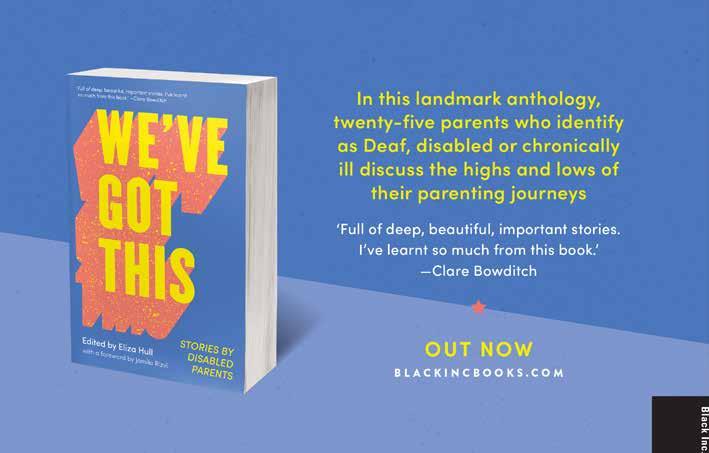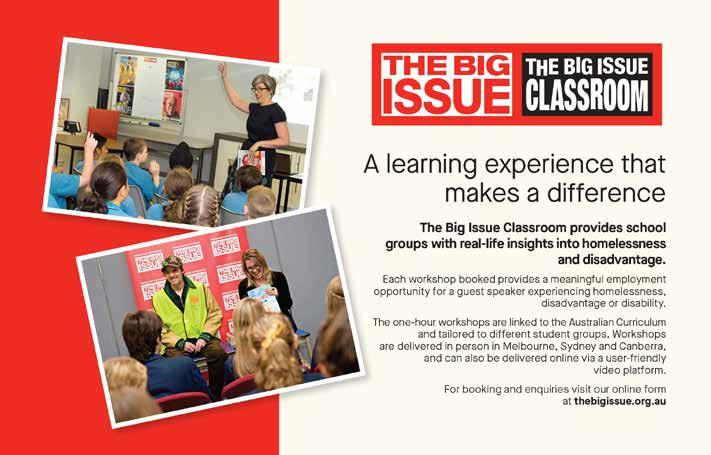
3 minute read
Book Reviews
The literary scene offers a host of reasons to keep calm and imagine what’s possible this month, which, after flood, pandemic and the possibility of world war, does come as some relief.
The longlist of 12 for the 2022 Stella Prize is a dynamic list indeed – extending beyond the standard novels, memoir and short fiction to include, for the first time, poetic forms as well. Seven of the books on the list are from debut authors, and five are from First Nations writers, which is cause for optimism. Stay tuned for the shortlist announcement on the 31st of this month.
Advertisement
Giramondo’s HEAT literary journal has made a triumphant return for the first time in 10 years. The journal will be published every two months, with a renewed commitment “to challenge convention and spark international exchange”. Edition #1 features some energetic new writing from Josephine Rowe, Sarah Holland-Batt, Mireille Juchau, Brian Castro and Cristina Rivera Garza. It’s a compact, singular, boundary-pushing little mag, bright orange in colour and well worth a look.
Melburnians will rejoice that the Art Book Fair is underway (17-27 March). If you’re into the intersection of art, design, language, publishing and DIY, then this is the place to be. There’s talks, launches, workshops (including one on how to make your own zines by The Sticky Institute) and the opportunity to hang out at the NGV and buy many beautiful, beautiful books. Read widely and well, folks! MF
THE GRASS HOTEL CRAIG SHERBORNE
A departed mother’s penetrating voice narrates Craig Sherborne’s fourth novel, addressing her surviving son in a distinctive stream-of-consciousness flow. Named for the son’s place of solace, where he nurtures would-be problem horses in paddocks far removed from the confusing tumult of society, The Grass Hotelsymbolically pairs these two family members who aren’t ideal models of love and support. The son much prefers the company of animals, while the mother holds court with stubborn vanity. When the family’s kindly patriarch dies, the other two lose that tempering presence and the mother descends further into dementia. The writing shows off Sherborne’s considerable experience as both a poet and playwright. It can be an uncomfortable read, both in its head-on confrontation of death and in the mother’s unfiltered, increasingly unreliable commentary. But it’s well worth those moments for its frank depiction of the way someone else’s presence lingers in our internal monologue, often unbidden. DOUG WALLEN
STRANGERS I KNOW CLAUDIA DURASTANTI
What does it take to know another person? Do you even need to understand someone in order to love them? Strangers I Know is a novel alive with an almost impatient curiosity. The narrator, Claudia, is seeking to understand her family. Both her parents are deaf and don’t share a common language. More confusingly for Claudia, they are prone to inventing stories, creating myths and telling outrageous lies. Set between New York, London and southern Italy, this novel explores what it means to belong when everyone is speaking a different language. As someone with hearing loss, it wasn’t surprising to learn that the author’s parents are deaf; Durastanti’s approach to storytelling feels like a deaf conversation. The novel resists linearity: it is responsive and recursive, deeply layered and logical. Each sentence becomes a story within itself: crafted, considered, yet surprisingly loose, playful and continually gesturing beyond itself – pulling in anecdotes, memories, and references to historical figures, artists, literature and film. It is simply dazzling. FIONA MURPHY
FOUND, WANTING NATASHA SHOLL
Natasha Sholl was in her early twenties when the man she planned to marry died beside her in his sleep. The sudden loss of him plunged her into a grief that was diagnosed as complex PTSD. Years later, a second intimate loss compounds the first. The reader is immersed under the author’s blanketing grief – as she alternately kicks against it and submits to its weight – for a long time, from the memoir’s opening pages. It starts off fractured, staccato, disoriented. “I needed help. To exist.” This can be difficult to read, but acutely captures the emotional texture, inherent contradictions and impossible social demands of grief. Sholl is fragile and tenacious in equal measure. Similarly, she struggles throughout to balance her loyalties to living and dead loved ones. That constantly negotiated balance – and her willingness to tell on herself – make her an intriguing narrator. JO CASE











